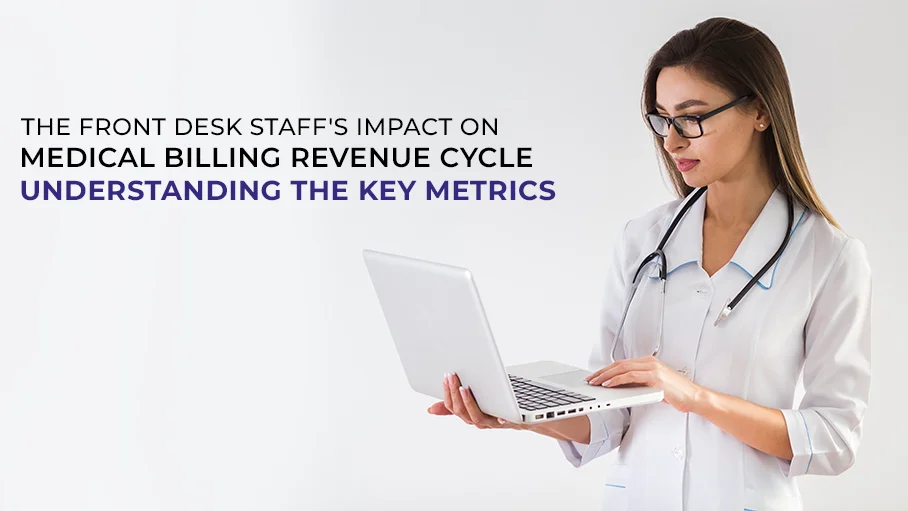Medical billing revenue cycle management is an essential aspect of healthcare, allowing providers to receive timely and accurate payment for their services. The front desk staff plays a critical role in the revenue cycle, ensuring that patient information is accurate, insurance is verified, and payments are collected. In this blog, we will explore the front desk staff’s role in the key stages of the revenue cycle and best practices for improving their performance.
The Front Desk Staff’s Role in Key Stages of the Revenue Cycle consists of three main stages:
- Pre-visit
- At-visit
- Post-visit
In the pre-visit stage, the front desk staff schedules appointments and collect patient information, including demographic and insurance information. In the at-visit stage, the front desk staff verifies insurance and collects co-pays. Finally, the front desk staff submits claims and collects outstanding balances in the post-visit stage.
Best Practices for Front Desk Staff in Medical Billing Revenue Cycle Management
The front desk staff plays a crucial role in the revenue cycle management process, ensuring that patient information is accurate, insurance is verified, and payments are collected. Here are some best practices that front desk staff can follow to optimize medical billing revenue cycle management:
- Pre-visit Stage: Accurate Patient Registration and Insurance Verification In the pre-visit stage, the front desk staff should ensure that patient information is entered correctly, and insurance verification is completed before the patient’s visit. Accuracy is critical to prevent errors and delays in the revenue cycle process. Front desk staff should also verify that the insurance plan covers the services the patient is seeking to avoid claim denials.
- At-visit Stage: Clear Communication with Patients and Efficient Collection of Co-pays In the at-visit stage, the front desk staff should communicate clearly with patients about their insurance coverage and payment responsibilities. Patients should be informed about their co-pays and any outstanding balances. The front desk staff should collect co-pays efficiently and accurately to prevent payment delays and reduce the risk of claim denials.
- Post-visit Stage: Timely Submission of Claims and Proactive Collection of Outstanding Balances In the post-visit stage, the front desk staff should submit claims promptly to avoid payment delays. They should also follow up with insurance companies and patients to ensure timely payments are made. Proactively collecting outstanding balances can help reduce the risk of unpaid claims and improve revenue cycle management.
- Use of Technology: Front desk staff can use technology to streamline the revenue cycle process. Electronic health record (EHR) systems can automate many tasks, such as patient registration, insurance verification, and claims submission. Electronic payment systems can also improve the collection of co-pays and outstanding balances.
- Training and education: The front desk staff should receive regular training and education on medical billing revenue cycle management best practices. This will help them stay up-to-date with changes in regulations and policies and improve their performance. Regular performance reviews and feedback can also help identify areas for improvement and promote ongoing education
Following best practices in medical billing, revenue cycle management can help front desk staff optimize their role in the revenue cycle process. Accurate patient registration, clear communication with patients, timely submission of claims, and proactive collection of outstanding balances are essential for revenue cycle success. Healthcare providers can use technology and provide ongoing training and education to enhance revenue cycle efficiency and improve patient satisfaction.
Measuring and Evaluating Front Desk Staff Performance Healthcare providers can measure and evaluate front desk staff performance using key metrics such as patient satisfaction, claim denial rates, days in accounts receivable, and collection rates. Setting performance goals and benchmarks can motivate staff and improve performance. Providing feedback and training can also help improve front desk staff performance.
Conclusion
The front desk staff is critical in medical billing revenue cycle management. Accurate patient information, efficient insurance verification, and timely submission of claims and collections are essential for revenue cycle success. By implementing best practices, measuring, and evaluating performance, healthcare providers can improve the performance of front desk staff performance and enhance revenue cycle management.





